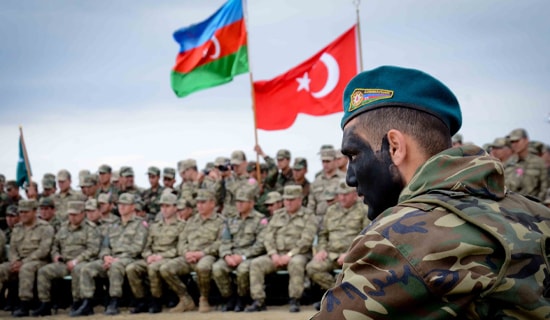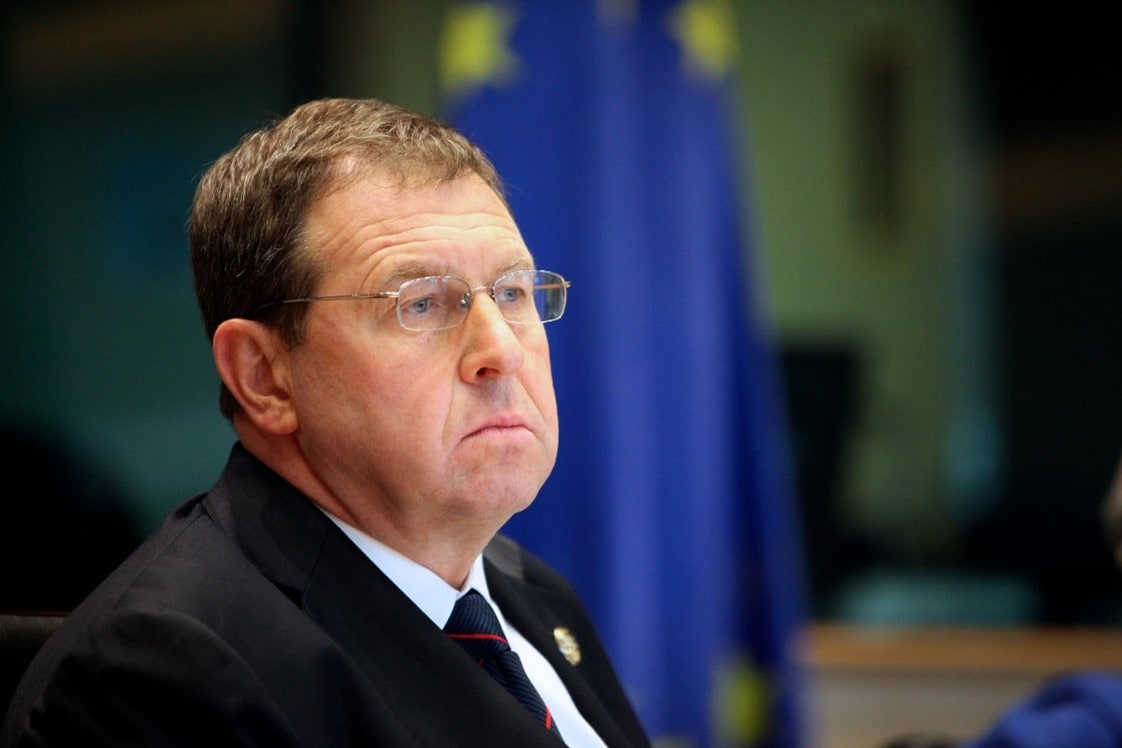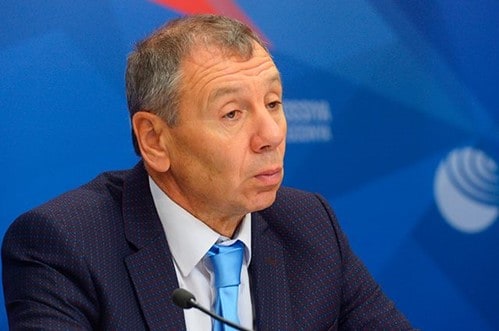
Joint Turkish-Azerbaijani military exercise (Source: Hetq.am)
On November 17, 2020, Russia's President Vladimir Putin answered questions on Russia's role in the Nagorno Karabakh war between Armenia and Azerbaijan. What was noticeable was the restraint that he exercised with regards to Turkey. Putin's policy has been under attack in this regard even from commentators who normally support him.[1] Putin explained his policy:
"Regarding Turkey and its role, it is well known, as Azerbaijan has explained on numerous occasions. Turkey has never made any secret that Azerbaijan has its unilateral support.
"What can I tell you? These are the geopolitical ramifications of the breakdown of the Soviet Union. So far, we have been discussing this topic in broad terms, but the developments we are currently witnessing are the specific manifestations of these consequences. What am I talking about here? Well, Azerbaijan is an independent sovereign state, and has every right to choose allies as it deems fit. Who can deny it this right? This is my first point.
"Second, as I have already mentioned, nobody has recognized Karabakh’s independence, even Armenia. What does this mean in terms of international law? It means that Azerbaijan sought to recover territories which Azerbaijan, and the entire international community, view as Azerbaijani territory. In this context, it had the right to choose any ally who could assist it in this endeavor.
"By the way, Turkey was originally a member of the OSCE Minsk Group for the Nagorno-Karabakh settlement. This means that it was part of the international institution, the international mechanism designed to facilitate the settlement. Turkey was not a co-chair though. There were three co-chairs: France, Russia and the United States. Turkey was not part of this group. Still, it was a member, one of the 11 states.
"You can assess Turkey’s actions any way you want, but it can hardly be accused of violating international law. There may be varying subjective assessments, but what I have just described is the actual state of affairs.
"As for the peacekeeping mission, it is true that Azerbaijan and Turkey kept speaking about the possibility of Turkish involvement in peacekeeping operations. I believe I eventually managed to convince our Turkish partners and our Azerbaijani colleagues that we should not create conditions or motives for undermining our agreements, which could provoke one of the parties to take extreme measures or actions.
"I am referring to the bitter legacy of the past, the tragic and bloody events that took place during the First World War, the genocide. This is a factor that can be recognized or rejected; some people do and others don’t recognize it.
"This is not a problem for Russia; we have long recognized it. But why provoke the Armenian side by the presence of Turkish military personnel on the contact line? I believe that President Erdogan was and is fully aware of this.
"We had no problems with that. We agreed that Turkey, acting at the request of Azerbaijan, would take part in monitoring compliance with the ceasefire conditions. We will do this together with Turkey. What I mean is that we have positive experience of collaboration in the Middle East, including in Syria, where we are working together with Turkey to organize joint patrols and convoys in the Idlib zone and on the Syrian-Turkish border.
SUPPORT OUR WORK

"There is no need for this kind of interaction in Nagorno-Karabakh, but we have agreed to set up a joint center, which will make use of unmanned aerial vehicles, drones, to jointly monitor the situation along the contact line, to jointly retrieve and analyze the information and, of course, to draw online conclusions from what is really taking place on the ground in real time.
"As for where this center will be located, this is quite another matter. It is obvious that it will be deployed on the sovereign territory of Azerbaijan, and Azerbaijan is free to decide where it would be expedient to locate the center.
"Question: I am referring to subjective assessments. There is much talk about Turkey’s role in this region. What is your general assessment of its role in what has happened over the past few months?
"Vladimir Putin: I think that assessing Turkey’s role is not part of my duties. Different people, different countries are assessed differently. As of now, there are different relations shaping up between this or that state and Turkey. We know the history, often dramatic history of relations between Turkey and Russia over the centuries.
"But do you know what I would like to focus on? The fact that many European nations had, let us say, an equally difficult and tragic history of relations with each other. France and Germany are a case in point. How many wars did they have with each other? Today they are jointly performing their NATO defense and security duties the way they think fit and are cooperating within the European Economic Community. They have overcome all this and stepped over it, and they are moving forward in the interests of their nations’ future. Why cannot we do the same here, in the Black Sea region?
"Certainly, our positions and points of view are not always the same, nor are they the same in all respects. Occasionally, they are diametrically opposite. But this is what the art of diplomacy is all about: finding compromises. And any compromise is based on respect for one’s partner."[2]
Putin's words did little to quell the controversy as could be observed in two dueling articles that appeared the next day on the Echo of Moscow website. Echo of Moscow is perhaps the flagship of Russian liberals but it also hosts Russian officials and defenders of Putin. Below is an excerpt from an article by Andrei Illarianov article criticizing Putin's unprecedented concession to Turkey and the article by Sergei Markov in defense of Putin's policy.
Andrei Illarianov is a senior economist who served as Putin's top economic adviser when he first became president in 2000. Illarianov broke with Putin in 2005 criticized Putin for denying that Nagorno Karabakh had been a Russian defeat – it actually entailed ten defeats. On the Turkish issue, Illarianov argued that "Putin’s seventh defeat was the fifth article of the trilateral statement of November 9: on the creation of a joint Russian-Turkish peacekeeping center to control the ceasefire. This is a flagrant violation of the basic principle of peacekeeping operations, according to which it is unacceptable to use the military personnel of a neighboring country as peacekeepers, which, moreover, is not only the most important ally of one of the conflicting parties, but also exaggeratedly demonstrates its allied relations and openly threatens to use force against another party. The main issue is, as it was already mentioned before in this article, that never before did the Russian authorities agree to a deployment of Turkish military on the territories that were once part of the Russian Empire or the USSR. All the more as today turkey is a NATO member. This, of course, does not mean that foreign servicemen were never present on the territory of the former Russian Empire or the former USSR. For example, NATO troops from the UK, Canada and Germany were deployed at the Baltic states on a rotational basis since 2017. But the Kremlin has never failed to remind how much it does not like this arrangement. Now, unlike the British, Canadian, and German servicemen who are deployed in the Baltics on a rotational basis (contrary to Putin’s statements) the Turkish military will end up in Azerbaijan on a permanent basis, not only without Putin’s objections, but also with his written and now verbal approval.
"The eighth defeat was Putin’s recognition of both the Turkish military mandate and the technical means which will be used by them in order to monitor actions of the Armenian side (who else will they be watching?):[3]

Andrei Illarianov (Source: Apostrophe.Ua)
In contrast Sergei Markov an assistant professor of Public Policy at Moscow State Sergey Markov defends Putin's policy in Nagorno Karabakh and the settlement achieved. In an article titled "Hear What Putin is Telling You" Markov offers a different take on Putin's remarks. He defended the Russian President for managing a complex policy via Ankara. On the one hand, Putin toughly defended Russia's positions and denied Turkey in Nagorno Karabakh the status that the Turks had achieved in Syria and this thanks to Russia's neutrality during the conflict. While relations with Erdogan were trying they offered the potential for radically transforming the balance of power against the Americans the EU and NATO. Markov wrote:
"Nagorno-Karabakh. Russia firmly informs Turkey that it [Nagorno-Karabakh] is not Idlib. Russia and Turkey are engaged in difficult, at times tough negotiations on peacekeepers.
"Turkey wants the Turkish peacekeepers to be on the line of demarcation along with the Russian ones – along the Syrian analogue, where the situation is like this. But Russia firmly says that this is impossible, because the Karabakh model of peacekeeping fundamentally differs from the Idlib one. Because in Syria Russia and Turkey side with different warring parties. Turkey is on the side of the Islamist opposition to Assad in Idlib, and Russia is on the side of Assad and Damascus. For that reason, they conduct joint patrols.
"However, a different framework exists in Nagorno-Karabakh. Russia is a neutral country that enjoys the confidence of both Armenia and Azerbaijan and helps both countries. And Turkey wants to present the situation in Karabakh according to Syrian scenario: Turkey is on the side of Azerbaijan, and Russia is on the side of Armenia. Russia points out that Armenia, as a party to the conflict, categorically distrusts Turkey. Armenia generally believes that it fought against both the Azerbaijani and Turkish armies. Therefore, Russia firmly says “No” to Turkey on the peacekeepers’ issue and equal status.
"But Turkey is desperate [to get a foothold] at the South Caucasus. And the Turkish parliament passed an authorization to send Turkish soldiers to Azerbaijan. They can turn up there under two models:
"1. Russia, as a goodwill gesture towards Turkey, will agree that the Turkish military will participate not as peacekeepers, but as observers in the peace monitoring center. And allow it to launch drones.
"2. The Turkish military can be on the territory of Azerbaijan as its allies by decision of the Azerbaijani authorities. Nobody can forbid them from doing so. Azerbaijan can decide this on its own.
"Putin and Erdogan are playing a complex game. Both of them seek advantages for their countries, and therefore they argue fiercely. At the same time, they want Russia and Turkey to move along the path of partnership towards a possible political union, which will inevitably be against the US, the EU and NATO. To achieve this is a huge task for Putin. If he [Putin] will accomplish this, then the new alliance of Russia and Turkey will change the entire geopolitics of Greater Europe and Eurasia in the interests of Russia and Turkey. Hear what Putin is telling you: Negotiations with Turkey are always difficult, but they are almost always successful."[4]

Sergey Markov (Source: Aif.ru)
[1] See MEMRI Special Dispatch No. 9032, Senior Journalist Eggert: Russian Leaders From The Tsars To Boris Yeltsin Kept The Turks At Bay, Now Under Putin, The Turks Have Entered The Caucasus And The Dreams Of The Turkish Sultans Have Come True, November 16, 2020. ; MEMRI Special Dispatch No.9035, Kommersant Columnist Maxim Yusin: Erdogan Is A Predator Who Does Not Tolerate A Geographic Vacuum, November 17, 2020.
[2] Kremlin.ru, November 17, 2020.
[3] Echo.msk.ru, November 18, 2020.
[4] Echo.msk.ru, November 18, 2020.




